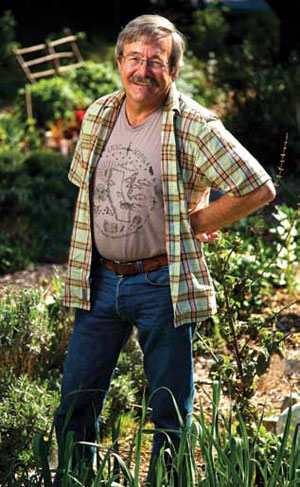Campus News
Uncommon People / Steve Gliessman: Planting the roots of agroecology deep in Santa Cruz
Agroecology is an interdisciplinary concept that extends beyond organic farming, and is widely known and taught in universities worldwide — thanks in part to UCSC Agroecology Program founder Steve Gliessman.

Gliessman was teaching at the Colegio Superior de Agricultura Tropical in Tabasco, Mexico, and studying the traditional Mayan techniques that form the foundation of sustainable small-scale farming that respects the land, farmers, and their culture.
Three years later, in 1980, Gliessman joined the UC Santa Cruz environmental studies faculty and founded the UCSC Agroecology Program. In 1997, he wrote the textbook Agroecology: The Ecology of Sustainable Food Systems and published a second edition 10 years later. Today, agroecology is an interdisciplinary concept that extends beyond organic farming, and is widely known and taught in universities (often using Gliessman’s textbook) across the nation and around the world.
“Steve is one of the pioneers and founders of agroecology worldwide,” said professor Miguel Altieri at UC Berkeley’s Department of Environmental Science, Policy and Management. “His influence has been enormous.”
Said another colleague, Professor Charles A. Francis, director of the Center for Sustainable Agricultural Systems at the University of Nebraska-Lincoln: “Three decades ago, agroecology was a little known idea in the minds of a few academics in Latin America, the U.S., and Germany. Through his writing and teaching, Steve became one of the most prolific and articulate advocates of this confluence of agriculture and ecology.”
Today, Gliessman, holder of the first endowed chair at UC Santa Cruz, the Ruth and Alfred E. Heller Chair in Agroecology, is scaling back ever so slightly. After all, he is supposed to be retired as of last July. But that hasn’t seemed to slow him down.
He spent two weeks teaching in Spain this winter. He’s organizing the 12th annual International Agroecology Shortcourse that will bring 35 to 40 participants from around the world to UCSC in July for two weeks of intensive instruction and practice in transforming food systems from field to table.
He continues to be editor-in-chief of the Journal of Sustainable Agriculture, and his Agroecology publisher is lobbying hard for a third edition because the book is selling better than ever.
Gliessman’s dream of establishing a “green kitchen” at the Program in Community and Agroecology (PICA), where he has focused his attention since 2002, is nearing fruition. Located at the Sustainable Living Center in UCSC’s lower quarry, PICA brings students from diverse disciplines to live in a community where they learn firsthand the principles of sustainable agriculture through classroom learning and community gardens.
The modular kitchen building will demonstrate the latest in green building, alternative energy, and reducing the carbon footprint, Gliessman says. He envisions it as a sustainable living laboratory for students from multiple majors to experience, learn about, and even research sustainable technologies.
Sustainability, as Gliessman defines it, is an approach to life based on treating the land in an ecologically sound way. It must also encompass a just system socially and economically that treats people, land, animals, and water in “a way that lasts forever.”
“It’s about healthy food, healthy land, and healthy people,” he says, “and it’s going to require some social changes.
“Social change doesn’t happen overnight,” Gliessman notes. The goal, he says, “is to create transformative action and a whole new way of thinking about the entire food system.”